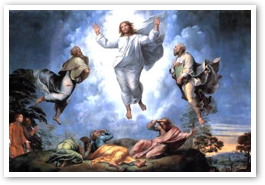Biblical sense of time lost on Church calendar
- FATHER RAYMOND J. DE SOUZA
It is incongruous that, at a time when Catholics are encouraged to increase their knowledge and devotion to the Scriptures, we diminish the biblical sense of time and season.
 Ascension Thursday. Forty days after the resurrection of the Lord Jesus, as it says right there in Acts 1:3, the first reading for Mass on that solemn feast. It has been a long time since I had a true Ascension Thursday, as in Canada we shift the observance of the feast to Sunday. Perhaps we should also amend that first reading from Acts: "appearing to them for 40 or 43 days...."
Ascension Thursday. Forty days after the resurrection of the Lord Jesus, as it says right there in Acts 1:3, the first reading for Mass on that solemn feast. It has been a long time since I had a true Ascension Thursday, as in Canada we shift the observance of the feast to Sunday. Perhaps we should also amend that first reading from Acts: "appearing to them for 40 or 43 days...."
We observed the Ascension this past Sunday in my parish, as we do throughout Canada. But on the previous Thursday I was visiting a priest friend in Canton, N.Y., and in New York state they keep Ascension Thursday on Thursday, and so I was able to join him for the evening Mass.
Here's a peculiar liturgical quirk. The American border is about a dozen kilometres from Sacred Heart of Mary Church on Wolfe Island. Let's say a few of my parishioners decided last Sunday to spend the day over in Cape Vincent and went to Sunday Mass at the parish church of—as you would expect—St. Vincent. They would have missed the Ascension altogether. When they were at home on Wolfe Island on Thursday, it was not observed, and when they were in New York on Sunday, it had already been observed. It is possible for my parishioners to miss the feast entirely without traveling more than a half hour from home.
Why the difference? The Ascension is a holy day of obligation, meaning the usual Sunday obligation to attend Mass applies. A long while back, the bishops of Canada and many other countries—including many parts of the United States—decided that getting to Mass on Thursday was too difficult, or too inconvenient, or somehow or other we were not quite up to what previous generations managed to do without cars or electricity. The bishops of New York thought that their people could manage it.
In Canada we didn't bother with half-measures; we went straight to the bottom, having the fewest holy days of obligation that Church law permits. The universal Church has 10 such days; bishops can propose additions if they wish—Ireland has St. Patrick's Day—or subtract some. Two holy days is the absolute minimum that must be kept. Canada has opted for only two: Christmas and the feast of the Mother of God (Jan. 1). It's a bit embarrassing.
So the Epiphany, Ascension and Corpus Christi are moved to Sunday, instead of being observed on their proper day. The Holy See does not permit bishops to move Christmas, otherwise we might well have Christmas shifted to the nearest Sunday in Canada, too.
The reason given for the shift is that fewer people would observe the principal feasts if they fell during the week. And that is undoubtedly true.
Convenience is not a dominant liturgical principle, but it is hard for the Church to swim against the tide when an entire culture is shaped by convenience. Technology has made this worse: "on-demand" is not a liturgical principle either. We lose something when we force the liturgical rhythm to fit into our schedule, rather than the other way around.
In Canada we didn't bother with half-measures; we went straight to the bottom, having the fewest holy days of obligation that Church law permits.
It may be true that in a culture which has largely lost any sense of the Lord's Day, to lament the loss of Ascension Thursday is worrying about a mote when there are beams aplenty about (Matthew 7:3-5). When most Catholics do not even observe their Sunday obligation, should we maintain our holy days, or just be content that those who worship on Sundays do that much? It's part of the perennial pastoral problem: Do we lower the standard to make it easier to meet, or do we maintain the standard in the hope of inspiring people to aim higher?
It is incongruous that, at a time when Catholics are encouraged to increase their knowledge and devotion to the Scriptures, we diminish the biblical sense of time and season. The Scriptures are punctilious about times and dates, especially in regard to worship. There are 40 days between the birth of Jesus and His going to the temple to be consecrated to the Lord. There are 40 days between the resurrection of Jesus and His going up to Heaven, to the glory of the blessed Trinity. It matters.
Forty days to the Ascension, 50 days to Pentecost, which we observe this Sunday. Seven is the biblical number for completeness, and Pentecost comes seven Sabbaths after the Resurrection. Seven times seven weeks is 49 days, and having completed fullness of fullness, the nascent Church is ready for Pentecost. The Holy Spirit comes at the "fullness of time" (Gal 4:4).
Liturgical time is what frees us from the prison of mere chronological time, of being trapped in history which, pace Toynbee, is just one damned thing after another. We need to live God's time, which is one holy thing after another.
 This is Meaghen Gonzalez, Editor of CERC. I hope you appreciated this piece. We curate these articles especially for believers like you.
This is Meaghen Gonzalez, Editor of CERC. I hope you appreciated this piece. We curate these articles especially for believers like you.
Please show your appreciation by making a $3 donation. CERC is entirely reader supported.

Acknowledgement
 Father Raymond J. de Souza. "Biblical sense of time lost on Church calendar." Catholic Register (June 5, 2019).
Father Raymond J. de Souza. "Biblical sense of time lost on Church calendar." Catholic Register (June 5, 2019).
This article is reprinted with permission.
The Author
Father Raymond J. de Souza is the founding editor of Convivium magazine.
Copyright © 2019 Catholic Register



